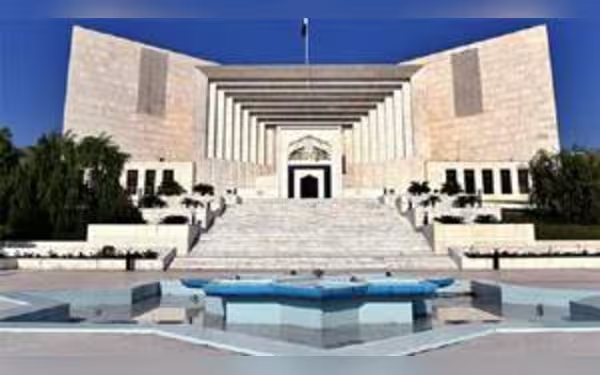Friday, October 4, 2024 10:36 AM
Supreme Court Verdict on Punjab Election Tribunals Tomorrow
- Supreme Court to announce verdict on Punjab election tribunals.
- ECP's authority to establish election tribunals under scrutiny.
- Amendment empowers ECP to appoint retired judges for tribunals.
 Image Credits: nation_pk
Image Credits: nation_pkSupreme Court to announce verdict on Punjab election tribunals, impacting ECP's authority and electoral integrity in Pakistan.
In a significant development for the political landscape of Pakistan, the Supreme Court is set to announce its reserved verdict on the Election Commission of Pakistan’s (ECP) appeal concerning the Punjab election tribunals case. This decision is expected to be revealed on September 30, a date that has garnered considerable attention from political analysts and citizens alike.
The case revolves around the authority to establish election tribunals, a contentious issue that has been a source of friction between the Lahore High Court (LHC) and the ECP for several months. The Supreme Court's five-member larger bench, led by Chief Justice of Pakistan (CJP) Qazi Faez Isa, had previously reserved the verdict earlier this week. The bench also includes Justices Amin-ud-Din Khan, Jamal Khan Mandokhail, Naeem Akhtar Afghan, and Aqeel Ahmed Abbasi.
At the heart of the matter is the ECP's request for a panel of serving judges from the LHC to form election tribunals. This request was made on February 14, and the LHC chief justice responded by nominating two judges on February 20. Subsequently, an additional six judges were nominated on April 14. However, the ECP only notified two of these judges on April 26, leading to objections regarding the additional names proposed for the Rawalpindi and Bahawalpur election tribunals.
The LHC chief justice countered these objections, insisting that the ECP should notify the election tribunals with the judges nominated by him. This back-and-forth continued, culminating in a May 29 order from Justice Shahid Karim, which mandated the ECP to appoint six more judges as election tribunals. The ECP, however, resisted this order, arguing that proceeding with the notifications would imply that the judges were solely appointed by the LHC chief justice, thus violating Section 140(3) of the Elections Act.
In a further twist, the then LHC Justice Malik Shahzad Ahmad established eight election tribunals to handle cases related to the February 8 polls, a decision that was subsequently challenged by the ECP in the Supreme Court. This dispute traces its roots back to amendments made to the Election Act of 2017, which dictate the criteria for judges serving on election tribunals.
Adding another layer to this complex situation, President Asif Ali Zardari approved the Election (Amendment) Bill 2024 on July 9. This amendment empowers the ECP to appoint retired judges of high courts to election tribunals without needing to consult the respective chief justices. This change has sparked discussions about the implications for the independence of the judiciary and the electoral process.
As the Supreme Court prepares to deliver its verdict, the outcome could have far-reaching consequences for the electoral framework in Pakistan. It is crucial for citizens to stay informed about these developments, as they directly impact the integrity of the electoral process and the functioning of democracy in the country. The decision will not only clarify the roles of the ECP and the judiciary but also set a precedent for how election-related disputes are handled in the future. In a nation where the electoral process is often scrutinized, this verdict could either reinforce public trust or further complicate the already intricate relationship between the judiciary and the electoral body.













